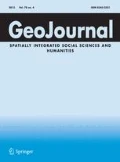Abstract
The concept 'new economy' is widely used to characterise the outcomes of contemporary restructuring processes – but in contrasting ways: by globalisation and the increasing use of communication and information technologies as well as by deregulation, polarisation, feminisation of employment and new, more flexible patterns and hours of work. These tendencies are interlinked and partly account for growing social and gender divisions. They pose problems for social sustainability but also develop differently in different economic and social formations. This paper develops a theoretical understanding of widening social divisions and their gendered form, indicates how these tendencies have developed to different degrees within the European Union and illustrates how the divisions are experienced by people in a local labour market in the neo liberal UK, where social and gender divisions are particularly wide.
Similar content being viewed by others
References
Baumol W., 1967: Macroeconomics of unbalanced growth: the anatomy of the urban crisis. American Economic Review: 415–426.
Beck U., 1992: The Risk Society.Sage, London.
Beck U., 2000: The Brave New World of Work. Polity Press, Cambridge.
Beck U., 2002: Zombie categories: Interview with Ulrich Beck.In Beck U. and Beck-Gernsheim E., Individualization. Sage, London.
Bourdieu P. and Wacquant L., 1999: On the cunning of imperialist reason. Theory Culture and Society 16(1): 41–60.
Carnoy M., 2000: Sustaining the new economy. Work, family, and community in the information age.Russell Sage Foundation, New York.
Castells M., 1997: The Power of Identity. Blackwell, Oxford.
Castells M., 2001: The Internet galaxy. Reflections on the internet, business and society.Oxford University Press, Oxford.
Chambaz C., 2001: Lone-parent families in Europe: A variety of economic and social circumstances. Social policy and administration 35(6): 658–671.
Copeland P., 2000: Foreword to new media f@ctfile, Brighton Wired Sussex Doogan K., 2001: Insecurity and long-term employment. Work, Employment and Society 15(3): 419–441.
Duncan S. and Pfau-Effinger B. (eds), 2000: Gender, economy and culture in the European Union Routledge, London.
Eurostat, 2001a: European social statistics-labour force survey results 2000.European Commission, Luxembourg.
social/news/2002/jan/ cce_en01_final.pdf}.
Eurostat, 2001c: Eurostat Yearbook 2001 The Statistical Guide to Europe Data 1989–1999.European Commission, Luxembourg.
Eurostat, 2001d: The Social situation in the European Union 2000.European Commission, Luxembourg.
Figart D. and Mutari E., 2000:Work time regimes in Europe: Can flexibility and gender equity coexist? Journal of Economic Issues, XXXIV(4): 847–871.
Folbre N. and Nelson J., 2000: For Love or Money-Or both? Journal of Economic Perspectives 14(4): 123–140.
Folbre N., 2001: The Invisible heart: economics and family values. New York Press, New York.
Gill, R. (2002) 'Cool, creative and egalitarian? Exploring gender in projectbased new media work in Europe', Information, Communication and Society 5: 1: 70–89.
Grogan S. et al., 2001: Setting the Scene . A Review of the Brighton and Hove Economy 2000–2001. Brighton and Hove Council, Brighton and Hove.
Harvey D., 2000: Spaces of Hope, Edinburgh University Press, Edinburgh.
Kelso P. 2002: Angry women find a voice over pay that doesn't add up. Guardian July 18th p. 5.
Lewis J. (ed.), 1997: Lone mothers in European welfare regimes: Shifting policy logics.Jessica Kingsley Publishers, London.
Perrons D., 1999: Flexible working patterns and equal opportunities in the European Union. Conflict or Compatibility? European Journal of Women's Studies 6(4): 391–418.
Perrons D., 2003: The new economy and the work life balance. A case study of the new media sector in Brighton and Hove. Gender work and organisation 10(1) 65–93.
Phillips A. and Taylor B., 1980: Sex and skill: notes towards a feminist economics. Feminist Review 9: 101–108.
Quah D., 1996: The Invisible hand and the weightless economy.Centre for Economic Performance Occasional paper No. 12. LSE, London.
Quah D., 2001: Technology dissemination and economic growth some lessons for the new economy.Public lecture University of Hong Kong (available from the author's website).
Reeves R., 2001: Happy Mondays. Putting the pleasure back into work.Momentum, London.
Reich R., 2001: The Future of Success Work and Life in the New Economy. Heinemann, London.
Rubery J. and Grimshaw D., 2001: ICTs and employment: The problem of job quality. International Labour Review 140(2) 165–191.
Sennett R., 1998: The corrosion of character. WW Norton and Company, London.
TUC, 2002: About Time: a new agenda for shaping working hours. Trades Union Congress, London.
Strauss A. and Corbin J., 1998: Basics of qualitative research: Techniques and procedures for developing grounded theory 2nd ed. Sage Publications, Thousand Oaks
UNDP, 2001: Human Development Project Report 2000. Wade R.H., 2001: Is globalisation making world income distribution more equal? Working Paper Series 1(1). LSE Development Studies Institute, London School of Economics.
Wills J., (2002): Union Futures. Building networked trade unionism in the UK. Fabian Ideas 602. Fabian Society, London.
Women's Unit, 2000: More choice for women in the new economy: the facts.Cabinet Office, London.




